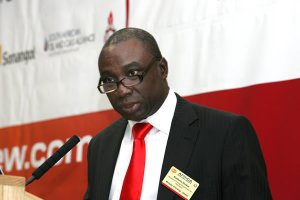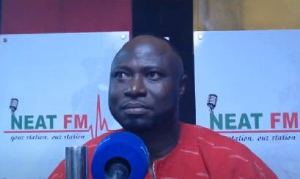Business News of Tuesday, 25 November 2014
Source: BFT
No honeymoon for Power Minister
It would be an understatement to say that Dr. Kwabena Donkor’s job is well cut out for him as he faces his colleagues in parliament soon to be vetted for the newly created post of Minister for Power.
The new ministry, according to President Mahama, is expected “to bring about a sharper focus on the generation, supply and efficiency of power to match the growth the economy is experiencing.”
While he would immediately have to oversee taking the country out of the ongoing rationing of power, the new minister would chiefly have to prove to Ghanaians that his boss’s promise of 5000megwatts by the end of 2016 is possible.
While at it, he would have to spend a lot of his time working out how to secure reliable supply of gas or whatever fuel is necessary for power generation, for that is the crux of the matter. Particularly, he would have to figure out how to wean the country off its reliance on N-gas, the Nigerian gas supplier which has proved to be unreliable, a position he holds dearly.
Dr Donkor holds the view that the electric power situation is a national security one and that Ghana cannot continue to tie her national security to the availability of gas from the West Africa Gas Pipeline.
Since the country is said to have effectively exhausted its hydro potential, a lot of new power would be generated by thermal means, which means an increasing demand for gas, which is preferred because it is twice cheaper than light crude oil, and is also more environmentally friendly in power generation.
While it would bring a measure of relief, not even the long-in-coming Atuabo Gas is said to be enough for the country’s increasing gas demand, which VRA projections for the year peg at over 350million standard cubic feet per day(MMSCFD), and over 650million MMSCFD by 2016.
A solution proffered by experts, including Dr Kwabena Donkor himself, is for the country to consider importing Liquefied Natural Gas while focusing more on exploiting its other gas reserves aside jubilee.
Dr Donkor, who heads the Parliamentary Select Committee on Mines and Energy, is also a firm believer in coal-fired power plants, an idea he would be expected to pursue as Minister for Power, or at least, support the realization of the 700megawatts coal plant proposed by the Shenzhen Energy Group, parent company of Sunon Asogli.
As Minister for Power, the energy expert may also get government to review the country’s building code to make it mandatory for new government buildings and real estate developers to incorporate solar energy in their projects. This could significantly reduce pressure on the national grid.
He believes in off-grid solar, which is solar power generated directly from panels mounted by homes or offices instead of grid-connected solar, which is solar generated by mounting solar panels on a large expanse of land and feeding it into the national grid.
He has expressed concern about the country’s approach to solar, which has so far been mainly grid-connected solar projects, beginning with the two megawatts plant at Navrongo in the Northern Region. Ghana has a basic energy problem, he argues, and a lot of power is needed to solve it while money is not readily available.
The country would therefore be better off if it invested in cheaper sources of energy for the national grid while relatively expensive solar energy is encouraged for individual deployment.
“Our peak demand is from 6pm to 11pm, and at that time grid-connected solar will not be available. The only other possibility is to store it, and doing so will add at least fifty percent to the cost,” he told the B&FT in a recent interview.
Furthermore, the Americans have proposed to support restructuring of the power sector agencies, particularly the ECG, which the World Bank describes as “a large, top-heavy, over-centralised organisation with significant weaknesses in its management, corporate governance, and institutional culture that call for a profound change.”
To this end, the second compact of the Millennium Challenge Account, close to US500million, has been dedicated to the power sector, and is expected to help attract “significant private investment into the energy sector,” according to the 2015 budget.
Part of the conditions for the release of the account in full is for the ECG to partner an “internationally reputable power distribution utility,” which hints at some decentralization of the ailing power distributor. Here too, the new minister would have his hands full.
In a 2013 report, the World Bank warned that the decent gains made when the economy grew by 14% in 2011 on the back of oil risked being eroded by the chronic ailment of the power sector.
Indeed, in Ghana’s checkered history as an independent country, if there is one sector the country never seems to get a hang of, it is the energy sector, which has often made staying indoors a sweaty business for the average Ghanaian while at the same time increasing costs for businesses.
There have been four major power crises in Ghana during the periods 1982/83, 1997/98, 2002/3 and 2006/7.
Around the second half of 2006, a mega power crisis hit the country due to a drought-induced reduction in the level of water in the Akosombo Dam. That was only a decade after a similar power crisis occurred in 1997/98.
It is however, the never-ending intermittent power outages and power rationing exercises in between these major crises that continue to exasperate the Ghanaian populace and get them grumbling on constant basis. Too many captains
Many have criticized government for creating too many agencies in the power sector, where they duplicate efforts and pass the buck when problems arise.
Dr. Charles Wereko Brobby, himself a part of the ups and downs in the energy sector, when he headed the Volta River Authority, has said, for instance, that there are too many chiefs in the energy sector.
“Eskom sells about 200,000 gigawatts’hours of power annually. In 2009, Ghana sold just under 5000, 2.5% of what Eskom sells, and guess what, in Ghana we have VRA, GRIDCo, Tico, Esco and Blaco...all with their Chief Executives, boards, directors, cars... to produce 2.5% of what ESKom is doing,” he argued in a 2013 lecture.
“That is why I say too many Chiefs creating’dum so,dum so’, because all they do is to try to deflect problems away from themselves. ECG says it’s not me and VRA says it’s not me...and because of this, we are not getting a holistic view of our power sector...” he said.
The creation of a ministry solely for the power sector while the energy ministry focuses on petroleum, has equally been met with scathing criticism from sections of the public, who are convinced the president could use some good advice.
“I believe the President and his team have no idea of the problems facing the country and their solutions,” commented one Solomon Nyamekye on citifmonline.com.
“Whatever they do seems to increase the woes of the people instead of solving our problems. What function will this new Ministry perform that the Ministry of Energy and its affiliated agencies can't perform if the necessary logistics are provided?” he asked.
But per the magnitude of the challenge, especially in respect of how long it is taking the country to provide for itself uninterrupted power supply, amidst increasing demand, it may be meet to, at least, give the president the benefit of the doubt.
It may be even more necessary to give DrKwabenaDonkor a chance, a man who, although is not new to the energy sector, has been vocal about the need for government to introduce some radical changes in order to bring about relief.
But there would be no time for leisure at the new ministry as Ghanaians continue to whine and as the epileptic power situation continues to feature consistently among the major challenges facing industry in the country.
“We recognise that adequate supply of energy remains a major challenge for us. This year, the cost of doing business in Ghana has gone up because of disruptions in electricity supply. Government recognizes that energy remains an absolutely critical requirement for sustainable economic growth and development,” the Finance Minister said in the 2015 budget statement.
Dr. Kwabena Donkor is the Member of Parliament for the Pru East Constituency and the Chairman of the Parliamentary Select Committee on Mines and Energy.
He was the pioneer Chief Executive of the Bulk Oil Storage and Transportation Company Ltd., (BOST) the State-owned petroleum Logistics Company with depots and pipelines across the country.
Dr. Donkor was also the pioneer Chief Executive of the Petroleum Commission, the upstream regulator. He has also been the Deputy Minister of Energy with responsibility for Oil and Gas and later Power.
Dr. Donkor holds MSc. and PhD degrees from the University of Bristol and an MBA degree from Lancaster Management School, University of Lancaster. He is also a Fellow of the Chartered Management Institute (UK), a Fellow of the Royal Society of Arts (UK) and a Member of the Chartered Institute of Energy (UK).











